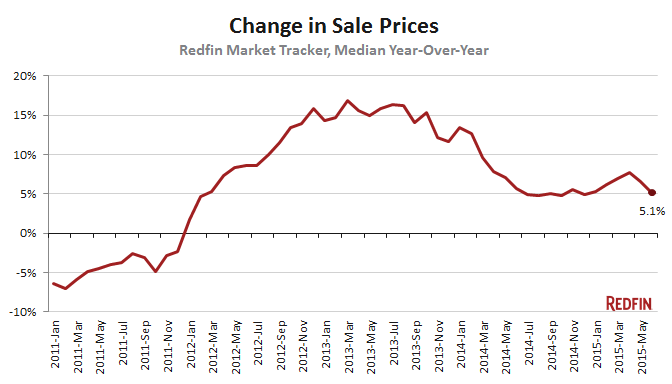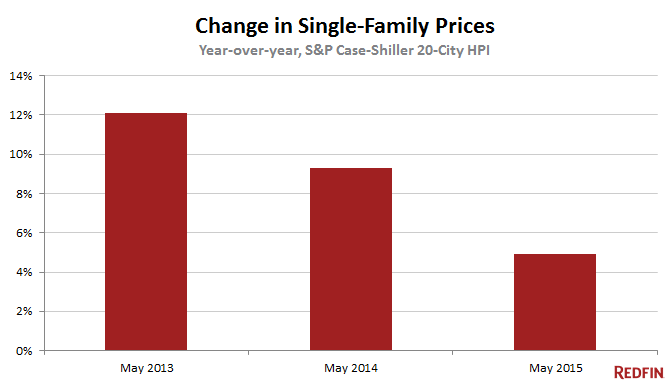Redfin, a multi-state real estate firm based in Seattle, says it is seeing "signs of an enduring slowdown" in the housing market. This isn't necessarily bad the company says, citing anecdotal information about bidding wars and mammoth profits rung up by short term owners. Slowing could mean a normalization of the housing market.
Or it could be another indication that the economy is slowing as well.
Redfin's Housing Demand Index tracks home tours and purchase offers in 15 metropolitan areas served by the company. It showed a 6.7 percent drop in June, a far steeper decline (albeit from a far higher level) than at the same time last year. The company says it expect prices to grow at a modest 2.2 percent in August (we assume that is an annual projection.)

Redfin noted that June's Pending Home Sales Index from the National Association of Realtors also took a dive, falling 1.8 percent after five straight months of increases, meaning fewer home sales in the pipeline. While it's routine for sales to slow this time of year, Redfin says, the steep decline caught economists off guard.
Price increases are also decelerating as indicated by both Redfin's Market Track and the S&P Case-Shiller Home Price Index. A slowing of appreciation is a good thing in this environment the company says, especially for buyers.


So what is behind the slowdown? Redfin cites a number of factors:
- Mortgage credit is tighter than it used to be and a lot of houses already are priced out of reach for a lot of people.
- Even though companies are hiring, employers aren't stepping up to the plate salary-wise. Abroad measure of compensation from theLabor Departmentshowed almost no growth in pay and benefits last quarter and economists at PNC Financial Services called it "a definite disappointment" that might give pause to the Fed as it ponders a rate hike.
- Global pressures are being brought to bear on housing, too. Economists at both Wells Fargo and CoreLogic have noted the strong U.S. dollar might discourage foreign buyers in some markets.
- Homeownership continues to decline. It is now at its lowest rate since 1967.
They cite demographics as well. The country is getting younger as the huge millennial generation crests, but since 2007, while the population of 18- to 34-year-olds grew by 3 million, the number of young adults living independently actually fell, from 42.7 million to 42.2 million this year. It is a confounding development, Redfin says, born of student debt and the slow economic recovery. It will probably change as the generation ages, but maybe it won't.
Homeownership is among the most reliable routes to building wealth so declining homeownership will mean it will be investors not homeowners who reap the benefits. That, Redfin says, spells trouble for the wealth gap. With more Americans renting and paying higher rent than ever that problem increases. One in four households now spend half or more of their income on rent.
But Redfin's take on slowing home sales may be more than a signal that housing is "normalizing." There are other clouds on the horizon. Existing home sales in June were very strong but the report on new homes sales, which probably came out after the Redfin article was written, showed a 35,000 decline in the June annual rate compared to May. July job creation was softer than anticipated and retail sales showed broad weakness, way below analysts' expectations at -0.3 percent with auto, furniture, building materials, and restaurant sales all down. Consumer sentiment has showed signs of softening and the Consumer Confidence index for July fell almost 9 points reflecting, according to Bloomberg, pessimism about the jobs outlook.
The month is young but three of the four economic reports out so far were not great. Factory orders for June rose respectably but construction spending was flat at +0.1 percent and both July manufacturing indices, the PMI and the ISM were down - 0.2 percent and 0.8 percent respectively.
Housing has been expected to drive the economy over the next few quarters and recent indicators show that it may need the help. If housing is also slowing as Redfin says, the future may be less rosy than we thought.







